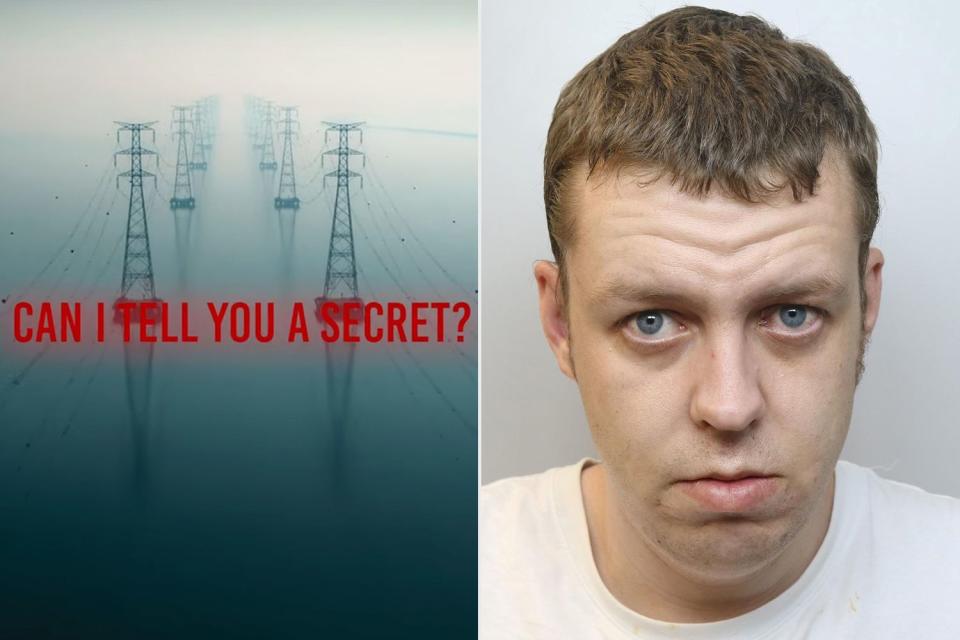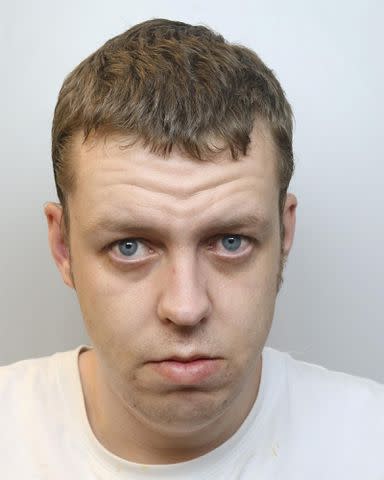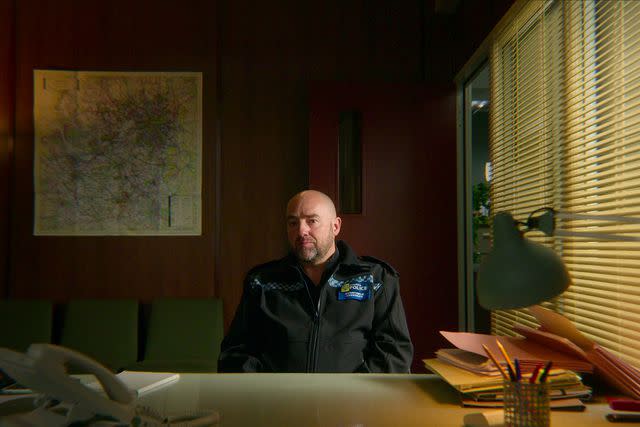“Can I Tell You a Secret”: Where Is Cyberstalker Matthew Hardy Now?
Matthew Hardy was the U.K.'s most prolific cyberstalker for more than a decade

Netflix; Cheshire Police / SWNS
Matthew Hardy stalked and harassed dozens of U.K. women online, opening almost all of his encounters with them with the same six words: "Can I tell you a secret?"
Hardy's crimes spanned more than a decade and are the subject of the new Netflix documentary Can I Tell You A Secret?, based on The Guardian podcast series of the same name.
Hardy used social media to cyberstalk women, at times creating fake profiles mimicking them and sending hateful, false and sexually explicit messages to their friends, followers and loved ones. Many of his victims said that their relationships with family members, employers and partners were irreparably harmed as a result of Hardy's hacking and harassment, which often included sending nude photos of his victims to people in their personal networks.
Related: American Nightmare: Where Are Denise Huskins and Aaron Quinn Now After the 'Gone Girl Kidnapping'?
"He would use the same picture as my actual account," accuser Gina Martin told The Independent. "He would strike up conversations with people, spreading rumors and lies." Martin said that Hardy would ask people she knew where she was and that he stalked her for nearly a year — and that other victims had even worse things happen to them at his hands.
"He has caused such damage to people, relationships have been completely severed," Martin told the outlet. "He said one of his other victims was sleeping with her mum's brother.”
It took 11 years to finally bring England's biggest cyberstalker to justice. More than two years after his sentencing, here's everything to know about Matthew Hardy's crimes — and where he is now.
Who is Matthew Hardy?

Cheshire Police / SWNS
Matthew Hardy.Hardy is an unemployed man from Northwich, Cheshire, U.K., who became the U.K.'s most prolific cyberstalker.
One of Hardy's victims, who went only by the pseudonym Melanie, told The Guardian that in school, Hardy was a target for bullies and seemed lonely. "He was always ignored by women. He never had a girlfriend. He never hung out with girls," she said. "I'm not a psychologist. But it seems to me that he was trying to get back at the girls who rejected him."
Another of his victims, classmate Gina Martin, said he seemed "isolated," so she made a conscious effort to greet him whenever she saw him.
What did Matthew Hardy do?

Courtesy of Netflix
Lia in 'Can I Tell You A Secret'.Hardy is accused of cyberstalking and harassing over a dozen girls and young women — though authorities told The Guardian that they suspected the total number of victims may actually be in the hundreds.
In 2009, Hardy first began cyberstalking girls he went to high school with in Northwich and the surrounding towns, before he then started targeting complete strangers. He'd message them from fake social media profiles, telling them their boyfriends were cheating on them or other falsehoods.
He'd often send messages about their lives and families (including harassing one classmate about her deceased mother) and would call them on the phone up to 50 times daily, often just breathing heavily and saying nothing. Other times, Hardy would call and describe to the victims what they were doing at that moment as a means of letting them know he was watching them.
Hardy would also hack into his victims' social media accounts or create fake accounts imitating them, which he used to send harassing messages — and at times stolen intimate photos of the victims — to their friends, followers and family members.
One of his victims, Abby Furness, alleged to The Guardian that Hardy sent intimate photos of her to her boss and messaged her boyfriend telling him Furness cheated on him, leading them to break up. She also alleged to The Sun that Hardy spread rumors that Furness was having a sexual relationship with her uncle. Another victim, Zoe Jade Hallam, accused Hardy of making a fake profile of her then-boyfriend's father and using it to send inappropriate messages to young girls.
"My boyfriend's dad was a doctor. It was really damaging to his professional reputation," Hallam told The Guardian. "And I felt [like I was] to blame. It was me that drew Matthew Hardy to him."
His cyberstalking and harassment continued even after he was eventually caught by police more than a decade after it began.
Who were Matthew Hardy's victims?

Courtesy of Netflix
Zoe in 'Can I Tell You A Secret'.Early on in his cyberstalking, Hardy's victims started as mostly his schoolmates in Northwich. These included Martin, Bailey, Samantha Boniface and Melanie, who told The Guardian that Hardy cyber-stalked and harassed roughly 25 of their female classmates. Within several years, he moved on to also harass girls and women from neighboring areas.
With the increased popularity of platforms like Instagram and Snapchat, Hardy expanded his reach to complete strangers, often targeting female influencers and women with large social media followings. These included Hallam, Furness and Lia Hambly. While investigating, police constable Kevin Anderson compiled more than 100 reports about Hardy from 62 victims, according to The Guardian — and that isn't counting potential other victims who didn't report his harassment to authorities.
How did Matthew Hardy get caught?

Courtesy of Netflix
PC Kevin Anderson in 'Can I Tell You A Secret'.Several of Hardy's victims contacted their local police early on in his cyberstalking campaigns against them, and at least two of them actually had some action taken. In May 2011, he received a warning for harassment, and that October, Northwich Guardian reported that Hardy pleaded guilty to hacking and harassment for taking over Boniface's Facebook account.
He was sentenced to a suspended prison term (which he never served), plus 250 hours of community service. He also had to pay £300 (about $377) in damages to Boniface, plus £120 (about $150) in court costs. Per The Guardian, Hardy was arrested nine other times, including once in 2013 when he pleaded guilty to harassment and hacking Bailey's social media accounts. Hardy received another suspended sentence for the offenses and Bailey obtained a restraining order against him at the time. He violated it by 2014.
Run-ins with the law didn't deter Hardy, and his harassment and cyberstalking continued for another full decade. Many of his victims expressed frustration with law enforcement not taking their complaints seriously, alleging that investigators would tell them to just go offline and that even some of their own loved ones blamed them for Hardy's conduct.
"If I didn't have my Instagram, I wouldn't have any income," Furness told Vice. "That's how people find me; that's how I get jobs. It was heart-wrenching for people to say 'Come off social media' because I didn't want to and I couldn't."
That changed in 2019, when Cheshire police constable Kevin Anderson was assigned to a stalking case in which Hardy was a suspect, according to The Guardian. Upon finding dozens of other victims in internal police data, Anderson reached out to several, including Hambly, who said when she reached out to her local police, they'd email her saying they'd look into it, but ultimately didn't do much to curb the problem. Hambly, a former paralegal, had compiled and organized more than 700 pages of screenshots from every single one of her interactions with Hardy across all of her social media accounts.
Anderson compiled Hambly's data, as well as screenshots and evidence from 61 other victims, totaling more than 100 incidents to present to prosecutors. Despite all of that evidence, Anderson only presented five specific cases to the court, though he had four others that the court could also take into consideration for sentencing if Hardy were convicted.
"I had to take a pragmatic approach," he explained to The Guardian. "With so many victims, it was difficult to portray what was happening. It could dilute the case if there were too many. So the strongest things were what we had on the indictment."
Hardy was arrested in February 2020 and denied all the allegations against him. He continued cyberstalking and harassing victims for over a year, and even found a new victim in a probation officer, harassing her so much that she slept with a baseball bat in fear of intruders, The Guardian reported.
Despite initially denying the allegations against him, in January 2022, BBC News reported that Hardy pleaded guilty to five counts of stalking involving fear of violence. He was also charged with harassment after breaching a restraining order.
What was Matthew Hardy's sentence?
Hardy was originally sentenced to nine years for stalking and reported to prison on Jan. 26, 2022, BBC News reported. Sentencing judge Steven Everett told Hardy that his victims did nothing to provoke his harassment and were put through "sheer misery" from his behavior, adding, "It will probably affect them for the rest of their lives."
Everett also said that laws regarding social media should be enacted and amended to prevent cases like this from happening again. Meta, the parent company of Facebook and Instagram, previously said in a statement that accounts imitating other people go against their terms of service and are removed when flagged.
In October 2022, The Guardian reported that Hardy's sentence was reduced from nine years to eight, with appellate judges claiming the original nearly-decade-long sentence was too high for the crimes he committed. Hardy's attorney, Sara Haque, told the court that his sentence was "manifestly excessive" in part because Hardy is autistic and has Asperger's disorder. The appeals judges in the case, however, said that Judge Everett did take Hardy's neurodivergence into consideration, but dropped a year off of his sentence due to a technicality from a 2017 law on stalker sentences.
Where is Matthew Hardy now?
Hardy remains in a "Category B" prison for stalking. According to The Guardian podcast Can I Tell You A Secret?, he's in a wing dedicated to inmates at higher risk of being attacked by fellow inmates. Representatives for the prison where he is held said that neurodivergent inmates receive treatment and support for rehabilitation, but Hardy's mother, Donna, said in September 2022 that other than "some help for his anxiety," he hasn't received any help for his autism spectrum disorder. She claimed no one explained to him who his key worker (similar to a social worker in the U.S.) is, and that he's supposed to see a probation officer monthly, but hadn't seen any.
Donna said that being in prison gave Hardy some perspective about his crimes. She recalled him telling her that he didn't know he was causing so much distress and that he said he was "just being silly."
"He has said to me, 'I don't want anything to do with social media ever again,'" Donna said. "Matthew knows he's lost a lot, and I'll be with him every step of the way [when he is released]."
He will be eligible for release in 2030, but because many inmates receive early releases for non-violent offenses in the U.K., The Guardian estimates that he may go free as soon as April 2026.
For more People news, make sure to sign up for our newsletter!
Read the original article on People.

